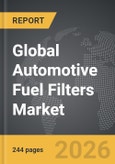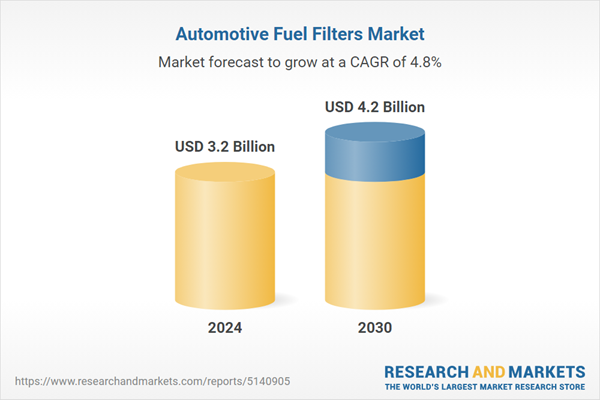Global Automotive Fuel Filters Market - Key Trends and Drivers Summarized
What Is the Role of Fuel Filters in Automotive Efficiency?
Fuel filters play a crucial role in maintaining the efficiency and longevity of automotive engines by preventing contaminants from entering the fuel system. These contaminants, including dirt, rust, and other particles, can cause significant damage to engine components, reduce performance, and increase emissions. As engines become more sophisticated, particularly with the rise of turbocharged and high-performance vehicles, the demand for advanced fuel filtration systems has intensified. Modern fuel filters are engineered to meet these needs, offering higher filtration efficiency and longer service intervals. Additionally, the increasing complexity of fuel systems, especially with the advent of direct injection engines, necessitates the use of more robust filtration technologies to ensure optimal engine performance and longevity.How Are Market Dynamics Shaping the Demand for Automotive Fuel Filters?
The automotive fuel filter market is heavily influenced by the evolving dynamics of the automotive industry, including changes in fuel types, engine technologies, and regulatory requirements. As stricter emission standards are enforced globally, automakers are compelled to enhance fuel efficiency and reduce pollutants, thereby driving the need for superior fuel filtration systems. The shift towards cleaner fuels, such as biofuels and low-sulfur diesel, further underscores the importance of using specialized fuel filters capable of handling the unique properties of these fuels. Additionally, the growing popularity of diesel vehicles in regions like Europe and Asia has expanded the addressable market for fuel filters, as diesel engines typically require more frequent and higher quality filtration compared to their gasoline counterparts.What Technological Innovations Are Redefining Fuel Filter Performance?
Technological advancements in filtration media and materials are at the forefront of the automotive fuel filter market's evolution. Manufacturers are increasingly adopting synthetic filter media over traditional cellulose-based materials due to their superior durability, efficiency, and longer service life. Innovations such as multi-layered filtration technology and the integration of sensors that monitor filter condition in real-time are also gaining traction, offering enhanced protection and performance. Moreover, the development of fuel filters designed to accommodate the unique challenges posed by modern fuel types, such as biofuels and ultra-low sulfur diesel, highlights the industry's responsiveness to market demands. These technological strides are not only improving the effectiveness of fuel filters but also contributing to the overall reduction in vehicle emissions and enhancement of fuel economy.What Are the Key Drivers Fueling the Growth of the Automotive Fuel Filter Market?
The growth in the automotive fuel filter market is driven by several factors, each contributing to the increasing demand and innovation in this sector. The rising global vehicle production, particularly in emerging markets, is a significant driver, creating a steady demand for both OEM and aftermarket fuel filters. Additionally, the trend towards longer vehicle lifespans and extended service intervals has spurred the adoption of high-quality, durable fuel filters that can withstand prolonged use. Consumer behavior also plays a crucial role, as the growing awareness of vehicle maintenance and the emphasis on engine performance and fuel efficiency are pushing consumers to opt for premium filtration products. Furthermore, regulatory pressures related to emissions and fuel efficiency standards are compelling automakers to integrate advanced fuel filtration systems into their vehicles, driving innovation and market growth. The increasing penetration of hybrid and electric vehicles, while presenting challenges, also opens up new avenues for specialized fuel filters designed to meet the unique needs of these technologies. Collectively, these factors are shaping a dynamic and rapidly evolving market, with significant opportunities for growth and development in the coming years.Report Scope
The report analyzes the Automotive Fuel Filters market, presented in terms of market value (USD). The analysis covers the key segments and geographic regions outlined below.- Segments: Filter Type (Diesel, Gasoline); Filter Media (Synthetic Filter, Cellulose Filter, Other Filter Medias); End-Use (Passenger Cars, Light Commercial Vehicles, Heavy Commercial Vehicles).
- Geographic Regions/Countries: World; United States; Canada; Japan; China; Europe (France; Germany; Italy; United Kingdom; Spain; Russia; and Rest of Europe); Asia-Pacific (Australia; India; South Korea; and Rest of Asia-Pacific); Latin America (Argentina; Brazil; Mexico; and Rest of Latin America); Middle East (Iran; Israel; Saudi Arabia; United Arab Emirates; and Rest of Middle East); and Africa.
Key Insights:
- Market Growth: Understand the significant growth trajectory of the Diesel Filter segment, which is expected to reach US$2.5 Billion by 2030 with a CAGR of 4.6%. The Gasoline Filter segment is also set to grow at 5.1% CAGR over the analysis period.
- Regional Analysis: Gain insights into the U.S. market, valued at $835.7 Million in 2024, and China, forecasted to grow at an impressive 7.2% CAGR to reach $916.6 Million by 2030. Discover growth trends in other key regions, including Japan, Canada, Germany, and the Asia-Pacific.
Why You Should Buy This Report:
- Detailed Market Analysis: Access a thorough analysis of the Global Automotive Fuel Filters Market, covering all major geographic regions and market segments.
- Competitive Insights: Get an overview of the competitive landscape, including the market presence of major players across different geographies.
- Future Trends and Drivers: Understand the key trends and drivers shaping the future of the Global Automotive Fuel Filters Market.
- Actionable Insights: Benefit from actionable insights that can help you identify new revenue opportunities and make strategic business decisions.
Key Questions Answered:
- How is the Global Automotive Fuel Filters Market expected to evolve by 2030?
- What are the main drivers and restraints affecting the market?
- Which market segments will grow the most over the forecast period?
- How will market shares for different regions and segments change by 2030?
- Who are the leading players in the market, and what are their prospects?
Report Features:
- Comprehensive Market Data: Independent analysis of annual sales and market forecasts in US$ Million from 2024 to 2030.
- In-Depth Regional Analysis: Detailed insights into key markets, including the U.S., China, Japan, Canada, Europe, Asia-Pacific, Latin America, Middle East, and Africa.
- Company Profiles: Coverage of players such as Airmatic Filterbau GmbH, Denso Corporation, Donaldson Co., Inc., FRAM Group IP LLC (FRAM Filtration), K&N Engineering, Inc. and more.
- Complimentary Updates: Receive free report updates for one year to keep you informed of the latest market developments.
Some of the 41 companies featured in this Automotive Fuel Filters market report include:
- Airmatic Filterbau GmbH
- Denso Corporation
- Donaldson Co., Inc.
- FRAM Group IP LLC (FRAM Filtration)
- K&N Engineering, Inc.
- MAHLE GmbH
- Mann+Hummel GmbH
- Robert Bosch GmbH
- Sogefi SpA
This edition integrates the latest global trade and economic shifts into comprehensive market analysis. Key updates include:
- Tariff and Trade Impact: Insights into global tariff negotiations across 180+ countries, with analysis of supply chain turbulence, sourcing disruptions, and geographic realignment. Special focus on 2025 as a pivotal year for trade tensions, including updated perspectives on the Trump-era tariffs.
- Adjusted Forecasts and Analytics: Revised global and regional market forecasts through 2030, incorporating tariff effects, economic uncertainty, and structural changes in globalization. Includes historical analysis from 2015 to 2023.
- Strategic Market Dynamics: Evaluation of revised market prospects, regional outlooks, and key economic indicators such as population and urbanization trends.
- Innovation & Technology Trends: Latest developments in product and process innovation, emerging technologies, and key industry drivers shaping the competitive landscape.
- Competitive Intelligence: Updated global market share estimates for 2025, competitive positioning of major players (Strong/Active/Niche/Trivial), and refined focus on leading global brands and core players.
- Expert Insight & Commentary: Strategic analysis from economists, trade experts, and domain specialists to contextualize market shifts and identify emerging opportunities.
Table of Contents
Companies Mentioned (Partial List)
A selection of companies mentioned in this report includes, but is not limited to:
- Airmatic Filterbau GmbH
- Denso Corporation
- Donaldson Co., Inc.
- FRAM Group IP LLC (FRAM Filtration)
- K&N Engineering, Inc.
- MAHLE GmbH
- Mann+Hummel GmbH
- Robert Bosch GmbH
- Sogefi SpA
Table Information
| Report Attribute | Details |
|---|---|
| No. of Pages | 244 |
| Published | February 2026 |
| Forecast Period | 2024 - 2030 |
| Estimated Market Value ( USD | $ 3.2 Billion |
| Forecasted Market Value ( USD | $ 4.2 Billion |
| Compound Annual Growth Rate | 4.8% |
| Regions Covered | Global |









